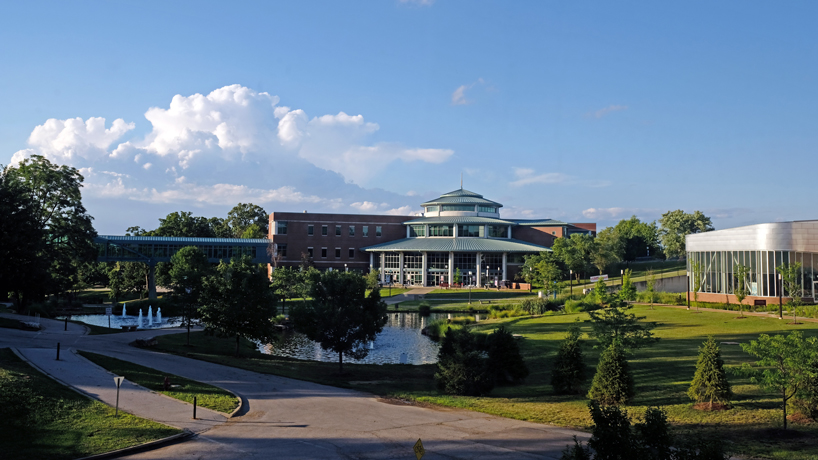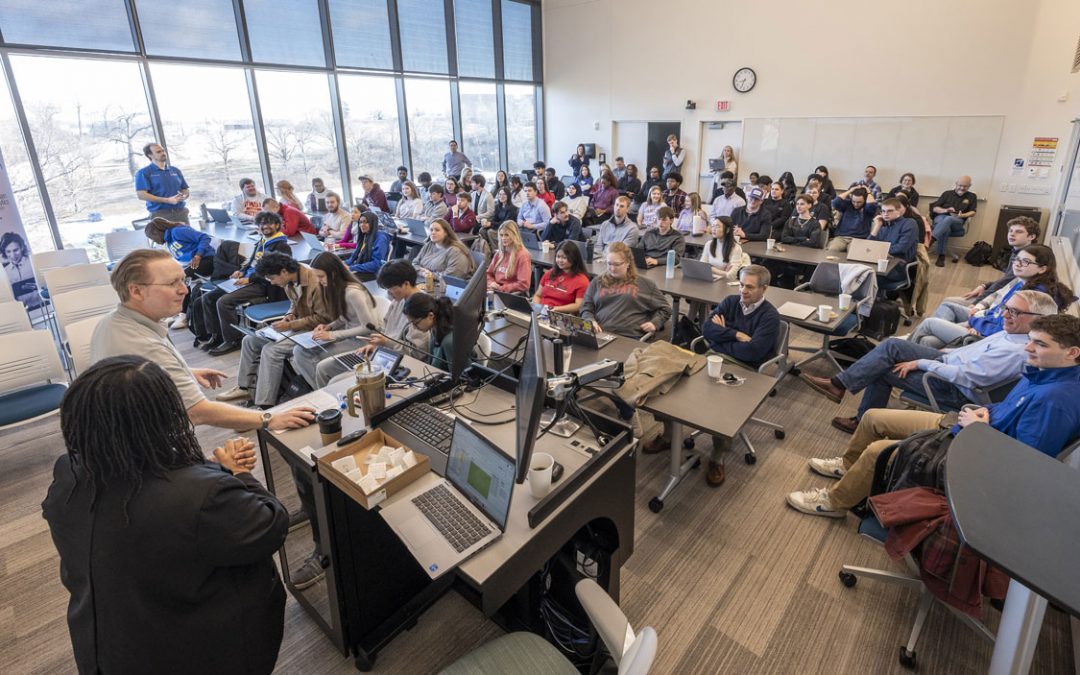
UMSL has joined with other public- and private-sector institutions in the GeoFutures Initiative with a goal of helping St. Louis become a national hub for geospatial technology. (Photo by August Jennewein)
The University of Missouri–St. Louis is joining with other leaders from St. Louis’ public and private sectors in a new initiative to bolster the region’s rapidly growing geospatial sector and develop a strategic plan for the future.
The initiative, called GeoFutures, is being launched just ahead of the groundbreaking next month of the new $1.75 billion Next NGA West Campus just north of downtown.
It will be guided by an advisory committee that features a broad and diverse group of leaders from the region’s public, business, civic and academic sectors. Andrew Kersten, dean of the College of Arts and Sciences, is representing UMSL on that committee.
“Because of the new NGA campus, the future for geospatial technology is very bright in this region,” Kersten said. “UMSL, as St. Louis’ public, land-grant, research-intensive university, will make powerful contributions, encouraging innovation and boosting economic development.”
Geospatial technology relates to the collection or processing of data that is associated with location. These technologies have come of age in the last decade and are now integral to how businesses function and the way people conduct daily activities. Geospatial technology powers satellite systems, mobile phone mapping and asset tracking, and it enables more effective decision-making in industries such as agriculture, mining, transportation and city planning.
GeoFutures will collaborate as a community, working together to create a shared vision and align the efforts of many people and institutions towards the common goal of making St. Louis the nation’s geospatial center of excellence.
“To win the long game, we know we need to assemble the best minds from the region to shape an intentional forward-looking strategy,” said Andrew Dearing, president of Spatial STL Advisors and manager of GeoFutures. “We need an agenda for growth.”
Kersten believes UMSL can play a significant role.
“Our graduates can engage in various fields such as computing technology, cybersecurity, business and education,” Kersten said. “Our faculty researchers will help advance the frontiers of knowledge through their work in computer science, in artificial intelligence, in machine learning and in quantum computing.”
The GeoFutures initiative is committed not only to growth, but to equitable growth. The initiative will prioritize linking the work to opportunities that help achieve racial equity by, GeoFutures Initiative Announcement among other possibilities, reducing barriers to career pathways, particularly for African American residents.
In addition to the Next NGA West Campus, St. Louis is awaiting the opening of the GeoSaurus geospatial innovation resource center at T-REX and already has a thriving geospatial startup community, positioning the region to become the nation’s center for geospatial excellence.
“We have the pieces here for something special and just need to develop the plan for how to put them all together,” said Otis Williams, executive director of the St. Louis Development Corporation. “That’s why the GeoFutures Initiative is so important.”
Connecting geospatial technology to St. Louis’ other established economic sectors – including agriculture technology, financial technology, cyber security, and transportation logistics – provides a tremendous opportunity for future growth in the geospatial sector.
Additionally, NGA has announced that it will declassify 20 percent of its new campus – opening up unprecedented opportunities to collaborate with academic, commercial and other innovation partners and creating immense potential for new startup opportunities.
Addressing the Geospatial Gateway Forum in St. Louis earlier this month, NGA Director Vice Admiral Robert Sharp said: “The strength of our agency exists in the partnerships we have and will have here in the St. Louis region. We are excited about moving into north city and cultivating connectivity with the community.”
The global market for geospatial location data, products and services is expected to reach over $439 billion with double-digit growth each year. In the St. Louis region, geospatial technology is responsible for 27,053 total employment impact and $4.9 billion in total regional economic activity. Every one direct geospatial job creates another 1.55 jobs in St. Louis region.
GeoFutures Advisory Committee
Zekita Armstrong Asuquo, president, Gateway Global
Aaron Bobick, dean, McKelvey School of Engineering, Washington University in St. Louis
Denise Cobb, provost and vice chancellor of academic affairs, Southern Illinois University Edwardsville
Rodney Crim, interim CEO and President, St. Louis Economic Development Partnership
Eric Druker, principal, Booz Allen Hamilton
Bob Elfanbaum, vice president of innovation, World Wide Technology, and co-founder, Asynchrony Labs
Dara Eskridge, executive director, InvestSTL
Mike Gourley, senior director, Maxar
Patty Hagen, president and executive director, T-REX
Jason Hall, CEO, Arch to Park
Stacy Hollins, associate professor of information systems, Maryville University
Steve Johnson, CEO, St. Louis Regional Economic Development Alliance
Andrew Kersten, dean of College of Arts and Sciences, University of Missouri–St. Louis
Bobbi Lenczowski, former NGA West executive
Emily Lohse-Busch, executive director, Arch Grants
Dennis Lower, president and CEO, Cortex Innovation Community
Brian Matthews, co-founder and general partner, Cultivation Capital
Jeff Mazur, executive director, LaunchCode
Tara Mott, account manager, Esri
Pete Ofstedal, St. Louis site manager, Leidos
Ken Olliff, vice president for research, Saint Louis University
Kristin Robertson, vice president and general manager, Autonomous Systems, Boeing Defense, Space and Security
Ernest Smiley, chief data scientist, Kingdom Capital
Dwayne Smith, interim president, Harris-Stowe State University
Kate Stewart, partner relations and institutional advancement, St. Louis Public Schools
Cindy Teasdale, executive director, Prepare.ai
Steven Ward, senior director of geospatial and weather sciences, The Climate Corporation
Bob Wetzel, vice president of corporate development, Enterprise Holdings Ventures
Otis Williams, executive director, St. Louis Development Corporation
Media Coverage
St. Louis Post-Dispatch
St. Louis Public Radio
St. Louis Business Journal
KSDK














